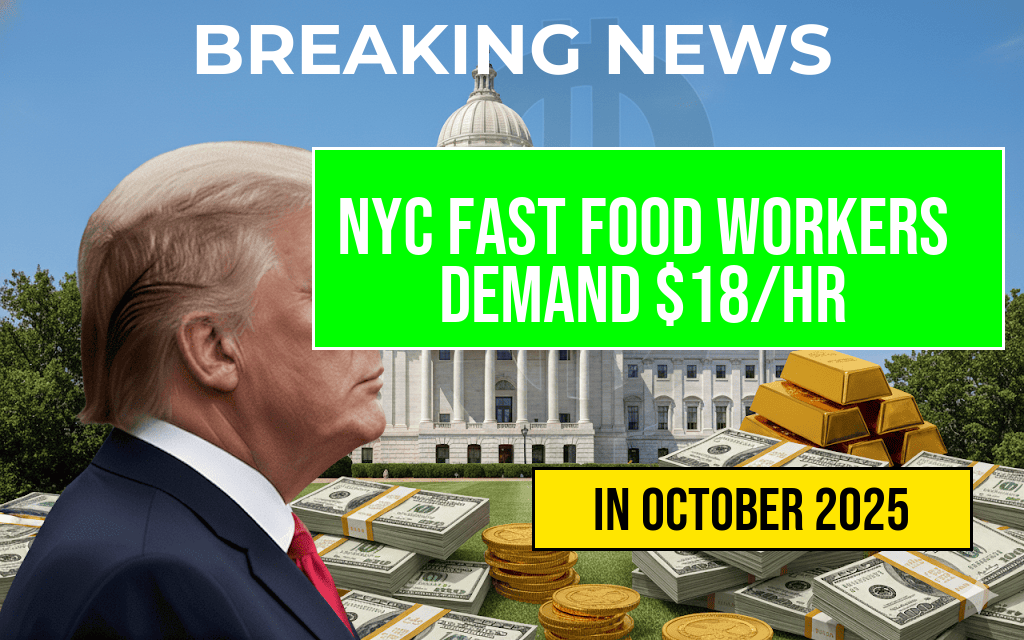Fast food workers across New York City are escalating their fight for higher wages, demanding an $18 an hour minimum wage amid rising living costs and economic pressures. Organized by local labor groups and supported by community activists, the campaign aims to address longstanding income disparities faced by frontline workers in one of the nation’s most expensive cities. The movement underscores broader debates over fair compensation in the service industry, especially as fast food chains generate record profits. Workers argue that an increase to $18 an hour is essential for ensuring basic living standards, reducing turnover, and recognizing their contributions to the city’s bustling economy. As negotiations with major restaurant franchises and city officials continue, the campaign highlights the ongoing struggle between low-wage workers and corporate interests, set against the backdrop of New York’s evolving labor landscape.
Background on Wage Disparities in NYC’s Fast Food Sector
Despite New York City’s reputation as a hub of economic opportunity, fast food workers often struggle with wages that lag far behind the city’s high cost of living. According to recent reports from the Cost of Living in NYC, the median rent for a one-bedroom apartment exceeds $2,500 per month, while many fast food employees earn less than $15 an hour. This disparity leaves workers in a precarious financial position, forcing many to juggle multiple jobs or rely on public assistance programs.
Current federal minimum wage stands at $7.25 an hour, though New York State has established a higher baseline of $15 an hour for large employers. However, workers in the fast food sector frequently report earning less than the mandated minimum in practice due to tipped wages, inconsistent scheduling, and employer violations. This gap has fueled calls for a dedicated minimum wage increase specifically tailored to fast food workers, who form a significant portion of the city’s essential workforce.
Key Demands and Campaign Strategies
| Demand | Strategy |
|---|---|
| Implement an $18/hour minimum wage for fast food workers in NYC | Organize protests, petitions, and direct negotiations with restaurant chains |
| Increase awareness of wage disparities among consumers and policymakers | Conduct public outreach, media campaigns, and community forums |
| Secure commitments from major franchises to raise wages | Leverage corporate social responsibility and consumer pressure |
Union Support and Broader Labor Movement
The campaign has garnered backing from prominent labor unions such as AFL-CIO and SEIU. These groups emphasize that fair wages are critical not only for worker well-being but also for the sustainability of the industry. Union representatives argue that raising the minimum wage to $18 an hour could reduce high turnover rates, improve service quality, and foster a more equitable economic environment in the city.
“Fast food workers are the backbone of New York’s economy, yet they’re paid wages that don’t reflect the city’s prosperity,” said Maria Hernandez, a spokesperson for the NYC Fast Food Workers Alliance. “Our goal is to ensure that workers can earn a living wage that covers basic needs, from rent to healthcare.”
Responses from Industry Leaders and City Officials
Major restaurant chains such as McDonald’s, Burger King, and Dunkin’ have expressed cautious openness to wage discussions but emphasize operational costs and competitive pressures. In a statement, a spokesperson for the National Restaurant Association noted, “While we recognize the importance of fair wages, any changes must consider the economic realities faced by small businesses and franchise owners.”
City officials have shown some support for the movement, with Mayor Eric Adams acknowledging the need for wage growth but stopping short of endorsing the $18 figure. “We are committed to supporting our workers and ensuring they are fairly compensated,” Adams said during a recent press conference. “We are exploring policies that balance economic sustainability with fair pay.”
Potential Impact and Future Outlook
If successful, the push for an $18 an hour minimum wage could set a precedent for other cities grappling with similar wage disparities in the service sector. Experts suggest that such a change might influence broader policy debates about living wages and labor protections across the country.
However, opponents warn that significant wage hikes could lead to increased prices for consumers or reduced hours for workers, especially in a highly competitive industry. A recent analysis by the Forbes notes that balancing fair wages with industry viability remains a complex challenge.
As negotiations continue, workers and advocates remain determined to press for tangible improvements. The campaign reflects a broader movement advocating for economic justice in one of the nation’s most vibrant urban centers, urging policymakers and corporate leaders to recognize the vital contributions of fast food employees.
Frequently Asked Questions
What is the main goal of the New York Fast Food Workers campaign?
The primary goal of the campaign is to advocate for a minimum wage of $18 an hour for fast food workers across New York City, aiming to improve their working conditions and economic stability.
Who are the main participants in the campaign?
The campaign primarily involves fast food workers in NYC, along with labor unions and advocacy groups supporting the movement for fair wages and workers’ rights.
Why is an $18 an hour minimum wage important for fast food workers in NYC?
An $18 an hour minimum wage is considered crucial to help fast food workers cover basic living expenses, reduce poverty, and address income inequality in the city.
What strategies are the campaigners using to achieve their goal?
Campaigners are organizing protests, public awareness campaigns, labor actions, and engaging with city officials to advocate for policy change.
How could the proposed wage increase impact the fast food industry in NYC?
A $18 an hour minimum wage could lead to higher labor costs for employers, potentially resulting in price adjustments, employment shifts, or improved worker satisfaction.

Leave a Reply